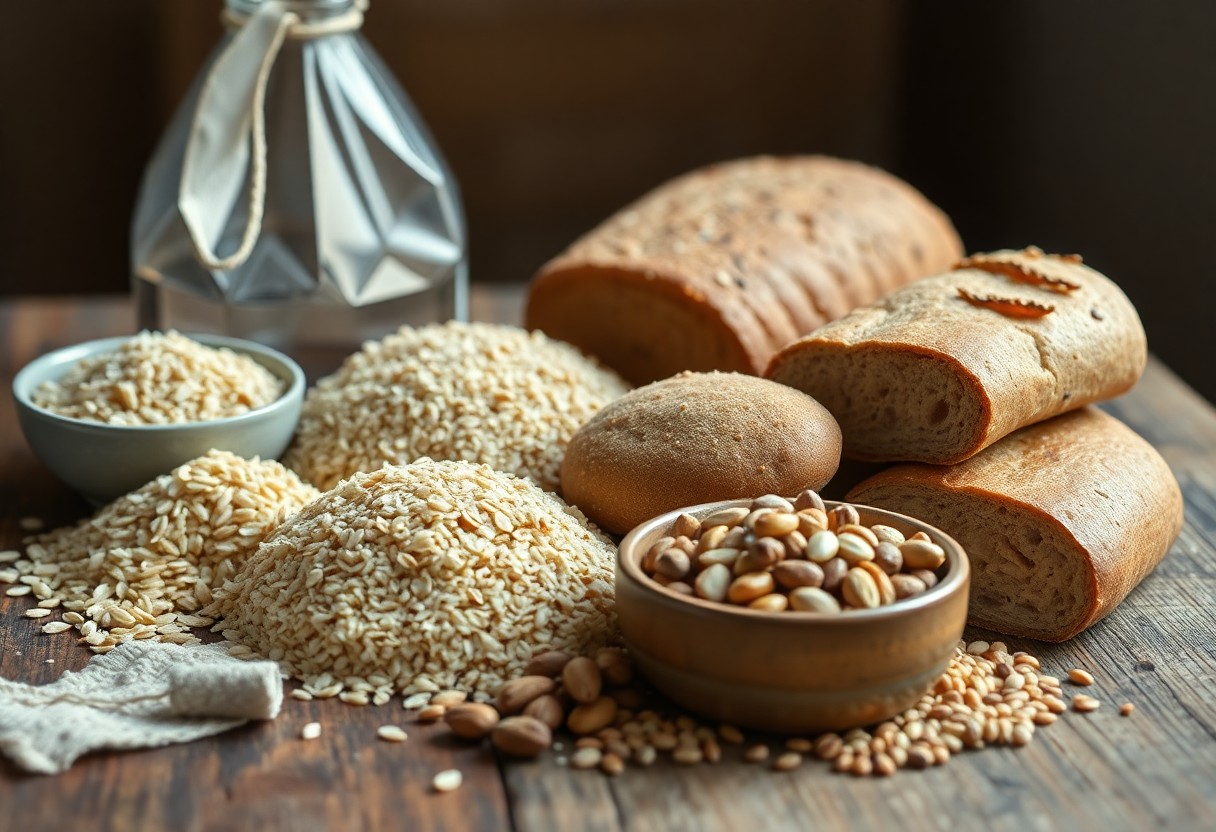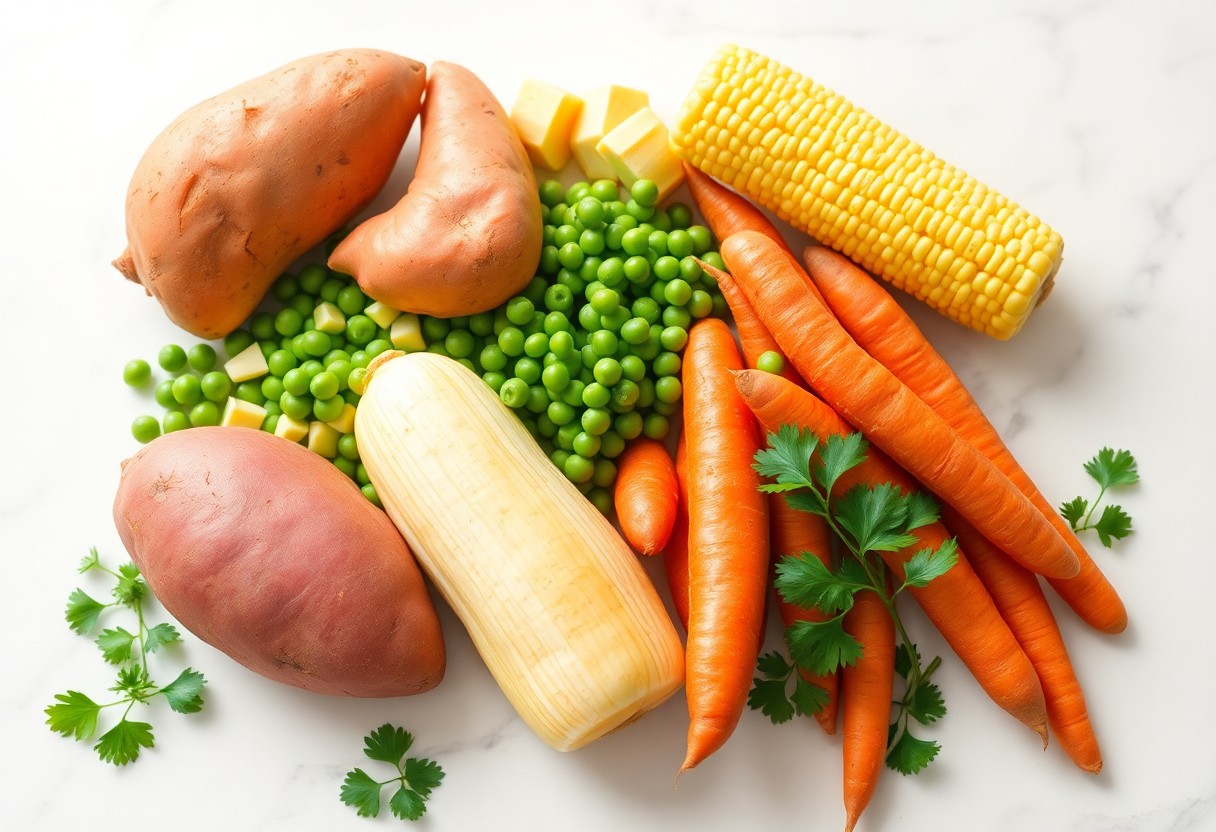Energy is imperative for powering your day-to-day activities, and incorporating foods high in carbohydrates can significantly enhance your stamina and productivity. From whole grains to fruits, these carbohydrate-rich options not only provide immediate energy but also support your overall health. Learning about the best carbohydrate sources will help you make informed choices to sustain your energy levels throughout busy schedules and workouts, ensuring you remain active and focused.

Understanding Carbohydrates
Your body relies on carbohydrates as a primary energy source, playing a vital role in supporting daily activities and overall health. Carbohydrates are organic compounds made of carbon, hydrogen, and oxygen, which are broken down into glucose for energy. They are crucial not only for fueling physical activities but also for maintaining brain function and other bodily processes.
Types of Carbohydrates
Your diet contains three main types of carbohydrates: sugars, starches, and fibers. Each type serves different purposes in your body.
- Sugars: Simple carbohydrates found in fruits and sweets.
- Starches: Complex carbohydrates found in grains and legumes.
- Fibers: Indigestible carbohydrates promoting digestive health.
- Soluble Fiber: Helps lower cholesterol and glucose levels.
- Insoluble Fiber: Aids in digestion and prevents constipation.
After understanding these types, you can make more informed dietary choices.
| Type | Examples |
| Sugars | Fruits, honey |
| Starches | Rice, bread |
| Fibers | Vegetables, whole grains |
| Soluble Fiber | Oats, beans |
The Role of Carbohydrates in Energy Production
To understand how carbohydrates function, consider their role in energy production. Carbohydrates are converted into glucose, which fuels cells for physical activity and metabolic processes.
It is crucial for your body to maintain a balanced intake of carbohydrates to support energy levels throughout the day. When consumed, carbohydrates are quickly broken down into glucose, providing immediate energy. Excess glucose is stored as glycogen in your liver and muscles for later use. If your glycogen stores become depleted, your body will then use fat and protein for energy, which can be less efficient and may lead to fatigue if not managed properly.
Whole Grains as Energy Sources
Some of the best sources of energy come from whole grains. Whole grains provide complex carbohydrates that break down slowly, supplying you with sustained energy for your daily activities. They also contain fiber, vitamins, and minerals that contribute to overall health and well-being, making them an necessary part of your diet for optimal performance.
Benefits of Whole Grains
Grains like brown rice, quinoa, and whole wheat are packed with nutrients that support your body's functions. They improve digestion due to their high fiber content and can help reduce the risk of chronic diseases, such as heart disease and diabetes. Incorporating whole grains into your meals can boost your energy levels while keeping you feeling full longer.
Top Whole Grain Foods
At the forefront of whole grain options are foods like oatmeal, barley, and bulgur. These nutrient-rich grains are versatile and can be enjoyed in various dishes, whether you're preparing breakfast, lunch, or dinner. They are also easily accessible and can be integrated into your daily meals without much hassle.
For instance, incorporating oatmeal into your breakfast routine can provide you with a hearty start to the day, while quinoa serves as an excellent base for salads. Whole grain bread can enhance your sandwiches, and brown rice pairs well with a variety of proteins and vegetables. By choosing these options regularly, you can enjoy their full nutritional benefits and maintain your energy throughout the day.
Fruits and Their Energy-Boosting Properties
Even on your busiest days, fruits can provide a quick energy boost while delivering important nutrients. Rich in natural sugars, vitamins, and minerals, they not only help fuel your body but also support overall health. Incorporating a variety of fruits into your diet ensures you optimize your energy levels, keeping you alert and ready for daily activities.
Nutritional Profile of Fruits
Around 80% of fruits consist of water, making them hydrating while also offering a source of carbohydrates your body needs for energy. They are packed with vitamins A, C, and various B vitamins, as well as dietary fiber and antioxidants. This nutrient density supports your immune system and aids in digestion, making fruits a vital part of a balanced diet.
Best Fruits for Energy
Their exceptional carbohydrate content makes bananas, berries, and apples ideal for sustaining your energy levels throughout the day. Bananas offer potassium and quick-release sugars, while berries are rich in antioxidants. Apples provide fiber, promoting lasting fullness and energy stability.
Also, including citrus fruits like oranges and grapefruits can enhance your energy due to their high vitamin C content, which aids in iron absorption and overall vitality. Dried fruits, such as apricots and raisins, are compact sources of natural sugars, giving you an instant energy spike. Consuming a mix of these fruits will help you stay energized and focused on your daily tasks.

Vegetables Rich in Carbohydrates
All vegetables can provide you with imperative nutrients, but those rich in carbohydrates are particularly effective at fueling your energy levels. Starchy vegetables like potatoes and corn offer substantial carbohydrate content, making them ideal for active individuals needing sustained energy for daily activities. Non-starchy vegetables, while lower in carbs, contribute fiber and vital vitamins, enhancing overall health and well-being.
Starchy vs. Non-Starchy Vegetables
At the core of vegetable choices are starchy and non-starchy varieties. Starchy vegetables, including peas and squash, generally possess higher carbohydrate levels, making them excellent energy sources. In contrast, non-starchy vegetables like spinach and broccoli are lower in calories and carbs, focusing more on vitamins and minerals than on energy production.
Nutrient-Dense Choices
To maximize your energy levels and nutritional intake, opt for nutrient-dense vegetables that provide more than just carbohydrates. Vegetables like sweet potatoes and beets not only supply necessary carbs but are also rich in vitamins A and C, potassium, and antioxidants. Incorporating these options into your meals ensures you receive a well-rounded nutrient profile that supports your active lifestyle.
Considering a variety of nutrient-dense vegetables in your diet helps ensure you get a mix of carbohydrates along with imperative vitamins and minerals. Sweet potatoes, for example, are packed with beta-carotene and fiber, enhancing digestive health while providing a steady energy source. Likewise, beets offer unique phytonutrients that may support endurance and recovery during physical activities. Choose a colorful array of vegetables to boost your overall health and maintain your energy levels throughout the day.
Legumes: A Protein and Carb Powerhouse
Now, legumes stand out as a fantastic source of energy, providing both protein and carbohydrates crucial for your daily activities. Packed with nutrients, legumes like beans, lentils, and peas can enhance your meals, offering sustained energy to help you power through your day.
Types of Legumes
The following table outlines common types of legumes:
| Type | Examples |
|---|---|
| Beans | Black beans, Kidney beans |
| Lentils | Brown lentils, Red lentils |
| Peas | Green peas, Split peas |
| Chickpeas | Garbanzo beans |
| Peanuts | Raw peanuts, Roasted peanuts |
Knowing the variety of legumes available allows you to incorporate them into various dishes, adding flavor and nutrition.
Benefits for Energy and Satiety
Among the many benefits, legumes contribute significantly to energy levels and satiety, keeping you feeling full longer, which is crucial for managing appetite and energy balance throughout the day.
Legumes are rich in fiber and complex carbohydrates, which help stabilize blood sugar levels and provide lasting energy. Their high protein content not only aids in muscle repair but also enhances feelings of fullness, making it easier for you to manage portion sizes in your meals. Embracing legumes in your diet will support your energy needs while helping you maintain a healthy sense of satiety.
High-Carb Snacks to Keep You Going
Keep your energy levels high throughout the day by choosing snacks rich in carbohydrates. Opt for whole grain crackers, fruit, or yogurt with granola to provide your body with the fuel it needs. These snacks not only satisfy your hunger but also release energy gradually, helping you maintain focus and productivity during busy hours.
Healthy Snack Options
Across various categories, healthy snack options abound for those seeking a carbohydrate boost. Consider snacking on fruits like bananas, apples, or berries, whole grain toast with avocado, or homemade energy bars. These choices ensure you are fueling your body with nutritious carbohydrates while enjoying delicious flavors.
How to Incorporate Them into Your Diet
One effective way to incorporate high-carb snacks is to plan your day around them. Designate specific times for snacking, ensuring that you always have healthy options available when hunger strikes.
Incorporate high-carb snacks into your diet by preparing them in advance and keeping them accessible. Stock your pantry with whole grain crackers, dried fruits, or nut butter, and pack fresh fruits or granola bars in your bag. Schedule snack breaks between meals, allowing you to sustain your energy without overeating. This proactive approach helps you maintain balanced energy levels throughout your day.
Conclusion
Hence, incorporating foods high in carbohydrates into your diet is vital for fueling your energy levels and supporting your daily activities. Whole grains, fruits, and vegetables provide the necessary nutrients to sustain your vitality throughout the day. By prioritizing these carbohydrate-rich foods, you can enhance your performance, boost your stamina, and maintain your overall health. Choose a variety of sources to optimize your energy and keep you feeling your best.
FAQ
Q: What are some examples of foods high in carbohydrates?
A: Foods high in carbohydrates include whole grains like brown rice and quinoa, fruits such as bananas and apples, vegetables like potatoes and corn, legumes including beans and lentils, and dairy products like milk and yogurt.
Q: How do carbohydrates provide energy?
A: Carbohydrates are converted into glucose, which is used by the body as a primary energy source. This energy fuels daily activities, exercise, and physical performance.
Q: Are all carbohydrates the same?
A: No, carbohydrates are categorized into simple and complex carbs. Simple carbohydrates are sugars found in fruits and sweets, while complex carbohydrates are found in whole grains and vegetables. Complex carbs provide longer-lasting energy.
Q: How can I incorporate more high-carbohydrate foods into my diet?
A: Incorporate high-carbohydrate foods by adding whole grains to meals, snacking on fruits, including vegetables in every meal, and consuming legumes as a protein source in salads and dishes.
Q: What is the role of carbohydrates in athletic performance?
A: Carbohydrates are necessary for athletes as they provide the energy needed for intense workouts. Consuming carbohydrates before and after exercise helps replenish glycogen stores and supports recovery.

0 Comments